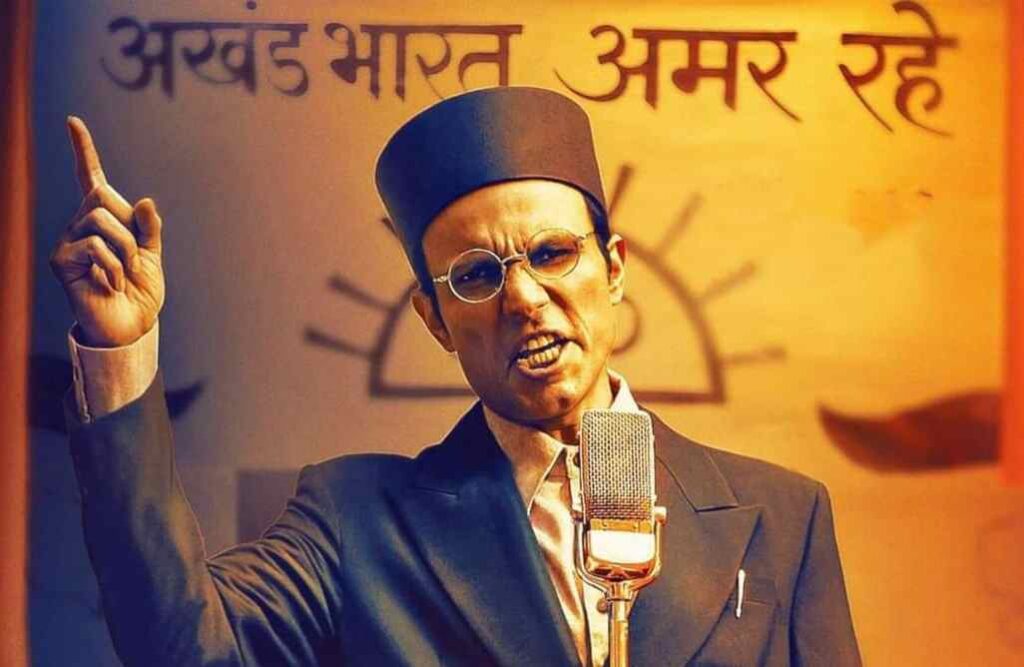Swatantra Veer Savarkar film delves into the life of Vinayak Damodar Savarkar, a prominent figure known for championing Hindutva ideology.

Swatantra Veer Savarkar film provides a comprehensive exploration of Vinayak Damodar Savarkar, a pivotal figure in Indian history renowned for his advocacy of Hindutva ideology. Through meticulous storytelling, the movie meticulously unveils the layers of Savarkar’s character, depicting him as a complex and compelling individual whose life was marked by a blend of intelligence, conviction, and increasing fanaticism.
Also Read:- Unveiling History: Exploring ‘Ae Watan Mere Watan’ – A Cinematic Journey of Resistance and Revolution
Swatantra Veer Savarkar Movie Review
Randeep Hooda’s involvement in the project as both the lead actor and director adds depth and authenticity to the portrayal of Savarkar. His nuanced performance brings out the intricacies of Savarkar’s personality, capturing the fiery passion and unwavering determination that defined him.
Moreover, Hooda’s directorial vision infuses the film with stylized staging and dramatic flair, creating a captivating cinematic experience that keeps audiences engaged throughout its three-hour runtime.
The narrative unfolds chronologically, tracing Savarkar’s journey from his formative years to his revolutionary activities and eventual imprisonment. From his deep affection for his older brother to his marriage to Yamuna, the film delves into the personal relationships and experiences that shaped Savarkar’s worldview. His time at London’s India House and encounters with revolutionary movements in Europe provide insight into his ideological evolution, while his arrest and deportation to India underscore the sacrifices he made for his beliefs.
However, the film’s portrayal of Savarkar is not without its flaws. While it admirably seeks to present an alternate perspective on India’s freedom struggle, it often veers into hagiography, glossing over certain aspects of Savarkar’s life and beliefs. This tendency is most evident in the film’s treatment of Savarkar’s contemporaries, particularly Mahatma Gandhi and Jawaharlal Nehru.
Gandhi, portrayed as weak and ineffectual, is unfairly vilified, while Nehru is depicted in a derogatory light, seemingly as a means of elevating Savarkar’s stature. These characterizations not only lack nuance but also perpetuate historical inaccuracies, undermining the film’s credibility as a biographical account.
Moreover, the film’s portrayal of Veer Savarkar‘s ideology, particularly his espousal of Hindutva and calls for a Hindu Rashtra, is problematic. While it attempts to present Savarkar as a visionary leader ahead of his time, it overlooks the exclusionary and divisive nature of his beliefs, particularly in contrast to Gandhi’s inclusive philosophy.
Despite these shortcomings, Swatantra Veer Savarkar succeeds in shedding light on a lesser-known aspect of India’s struggle for independence. Hooda’s dedication to the role, coupled with his directorial prowess, ensures that Savarkar’s story is brought to life with sincerity and authenticity.
However, a more balanced portrayal of Savarkar and his contemporaries would have enriched the film, preventing it from succumbing to reductionism and one-sidedness.
Also Read:- Yodha: Navigating Patriotism and Mixed Reviews in Bollywood
